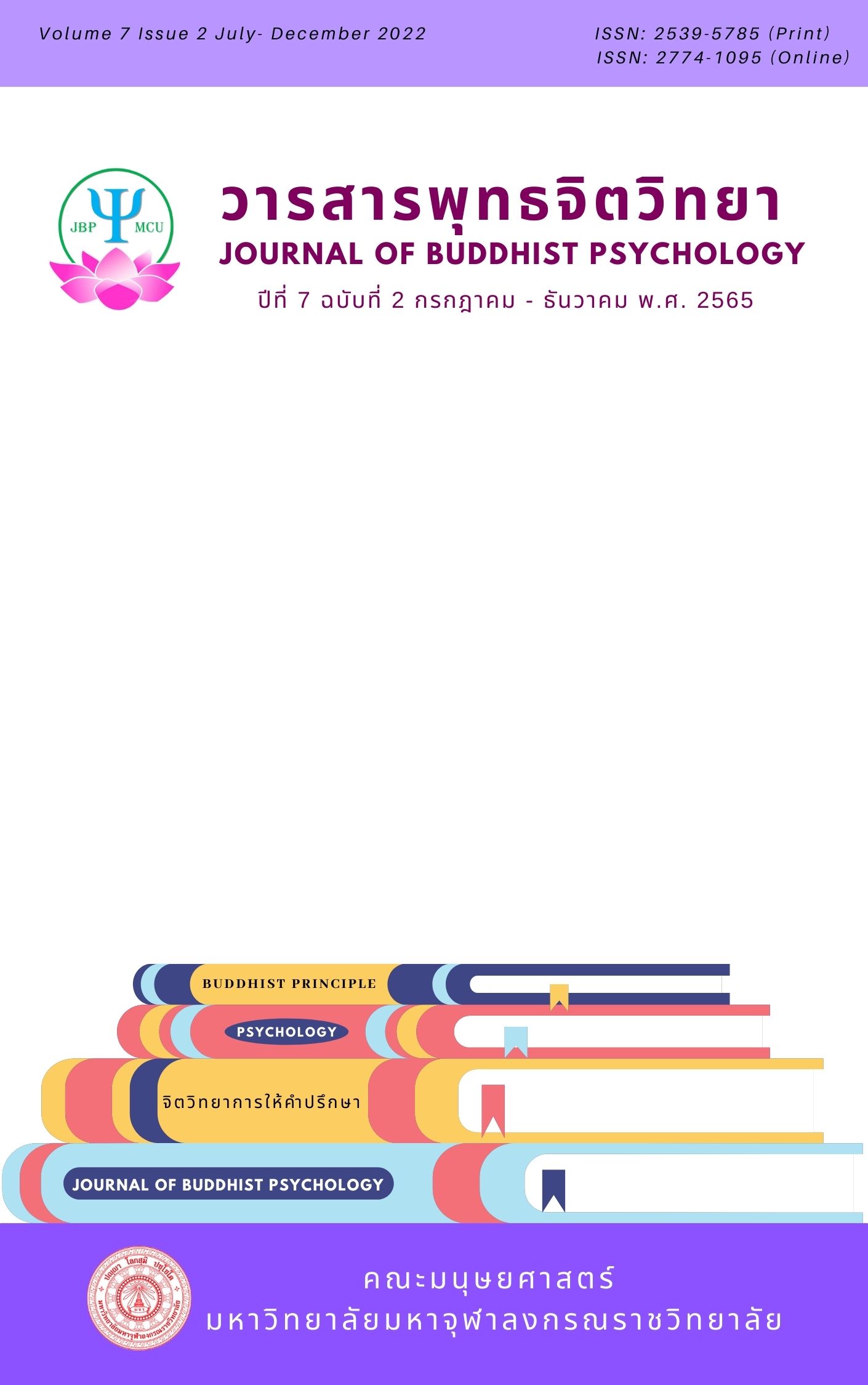การเสริมสร้างสุขภาพจิตเชิงบวกให้กับนักศึกษาระดับปริญญาตรี ในช่วงสถานการณ์แพร่ระบาดไวรัสโคโรนา (Covid – 19)
Main Article Content
บทคัดย่อ
บทความวิชาการนี้มีวัตถุประสงค์เพื่อศึกษาการเสริมสร้างสุขภาพจิตเชิงบวกให้กับนักศึกษาระดับปริญญาตรีในช่วงสถานการณ์แพร่ระบาดไวรัสโคโรนา ผ่านการทบทวนเอกสาร งานวิจัย แนวคิดทฤษฎีที่เกี่ยวข้อง สุขภาพจิตเชิงบวกไม่ได้มุ่งเน้นการศึกษาอาการเจ็บป่วยทางจิตใจ แต่เน้นศึกษาความเข็มแข็งทางจิต ผลการศึกษาในครั้งนี้พบว่า การเสริมสร้างสุขภาพจิตเชิงบวก สามารถสรุปได้ 3 ประเด็นคือ 1) การเสริมสร้างสุขภาพจิตเชิงบวกโดยอาศัยปัจจัยภายในบุคคล โดยอาศัยการดูแลสุขภาพให้แข็งแรง นอนหลับพักผ่อนให้เพียงพอ และหากิจกรรมที่เป็นประโยชน์ต่อตนเอง การออกกำลังกาย การขอบคุณตนเอง 2) การเสริมสร้างสุขภาพจิตเชิงบวกโดยอาศัยปัจจัยสภาพแวดล้อม ซึ่งเป็นปัจจัยที่ต้องใช้การปฏิสัมพันธ์กับบุคคลรอบข้าง 3) การเสริมสร้างสุขภาพจิตเชิงบวกโดยอาศัยปัจจัยภายนอก ซึ่งเป็นปัจจัยที่สิ่งแวดล้อมภายนอกมีผลให้สุขภาพจิตดีขึ้นเช่น การจัดกิจกรรมการเรียนรู้ที่ส่งผลต่ออารมณ์เชิงบวกต่อผู้เรียน
Article Details

อนุญาตภายใต้เงื่อนไข Creative Commons Attribution-NonCommercial-NoDerivatives 4.0 International License.
เอกสารอ้างอิง
นิจวรรณ เกิดเจริญ, วรุณา กลกิจโกวินท์ และ จอมเฑียร ถาวร. (2564). พลังสุขภาพจิต ผลกระทบต่อจิตใจและปัจจัยจากโรคโควิด 19 ที่มีผลต่อสุขภาพจิตของนักศึกษาแพทย์ ในช่วงการแพร่ระบาดของโรคโควิด 19. วชิรเวชสารและวารสารเวชศาสตร์เขตเมือง, 65(ฉบับเพิ่มเติม), 101–116.
Cohler, B. J. (1987). Adversity resilience, and the study of lives. Guilford Press.
Dong, E., Du, H., & Gardner, L. (2020). An interactive web-based dashboard to track COVID-19 in real time. The Lancet Infectious Diseases,20(5), 533–534.
Fredrickson, B. L. (2001). The role of positive emotions in positive psychology. The broaden-and-build theory of positive emotions. The American Psychologist, 56(3), 218–226.
Holmes, E. A., O'Connor, R. C., Perry, V. H., Tracey, I., Wessely, S., Arseneault, L., & Ford, T. (2020). Multidisciplinary research priorities for the COVID-19 pandemic: a call for action for mental health science. The Lancet Psychiatry, 7(6), 547-560.
Jahoda, M. (1958). Current concepts of positive mental health. Basic Books: New York.
Keyes, Corey. (2002). The Mental Health Continuum: From Languishing to Flourishing in Life. Journal of health and social behavior, 43, 207-22.
Keyes, C. L. M. (2005). The subjective well-being of America’s youth: Toward a comprehensive assessment. Adolescent and Family Health, (4), 3–11.
King, L. A., Hicks, J. A., Krull, J. L., & Del Gaiso, A. K. (2006). Positive affect and the experience of meaning in life. Journal of Personality and Social Psychology, 90(1), 179–196.
Lamers, S. M. A. (2012). Positive mental health: Measurement relevance and implications. Enschede the Netherlands: University of Twente Laban-Sharman, A., & Majumdar, A. (2021). Self-Care practices for anxiety during the COVID-19 pandemic in the UK in adults. Mental Health: Global Challenges Journal, 4(1), 9-20.
Lukat, J., Margraf, J., Lutz, R., van der Veld, W. M., & Becker, E. S. (2016). Psychometric properties of the Positive Mental Health Scale (PMH-scale). BMC Psychology, 4(8), 1-14.
Mahmood, Q.K., Sohail, M.M., Qureshi, W.A. et al. (2022). Role of positive mental health in reducing fears related to COVID-19 and general anxiety disorder in Khyber Pakhtunkhwa, Pakistan. BMC Psychol, (10), 163.
Public Health Agency of Canada. (2014). Mental Health Promotion: Promoting mental health means promoting the best of ourselves. Retrieved May 15, 2021, from https://www.canada. ca/en/public-health/services/health-promotion/mentalhealth/mental-health-promotion.html
Seligman, M. E., Steen, T. A., Park, N., & Peterson, C. (2005). Positive psychology progress: empirical validation of interventions. The American psychologist, 60(5), 410-421.
Townsend M.C. (2004). Essentials of psychiatric mental health nursing: Concepts of care in evidence-based practice. 6th ed. Philadelphia: F. A Davis.
Waterman, A. S., Schwartz, S. J., &. (2008). The implications of two conceptions of happiness for the understanding of intrinsic motivation. Journal of Happiness Studies,9(1), 41-79.
World Health Organization (2021). 6 ways to take care of your mental health and well-being this World Mental Health Day. Retrieved May 15, 2021, from https://www.who.int/ westernpacific/about/how-we-work/pacific-support/news/detail/0710-2021-6-ways-to take-care-of-your-mental-health-and-well-being-this-world-mental-health-day
World Health Organization (2008). Action plan for the global strategy for the prevention and control of noncommunicable diseases (2008–2013). Retrieved May 15, 2021, from http://whqlibdoc.who.int/publications/2009/9789241597418_eng.pdf?ua=1


